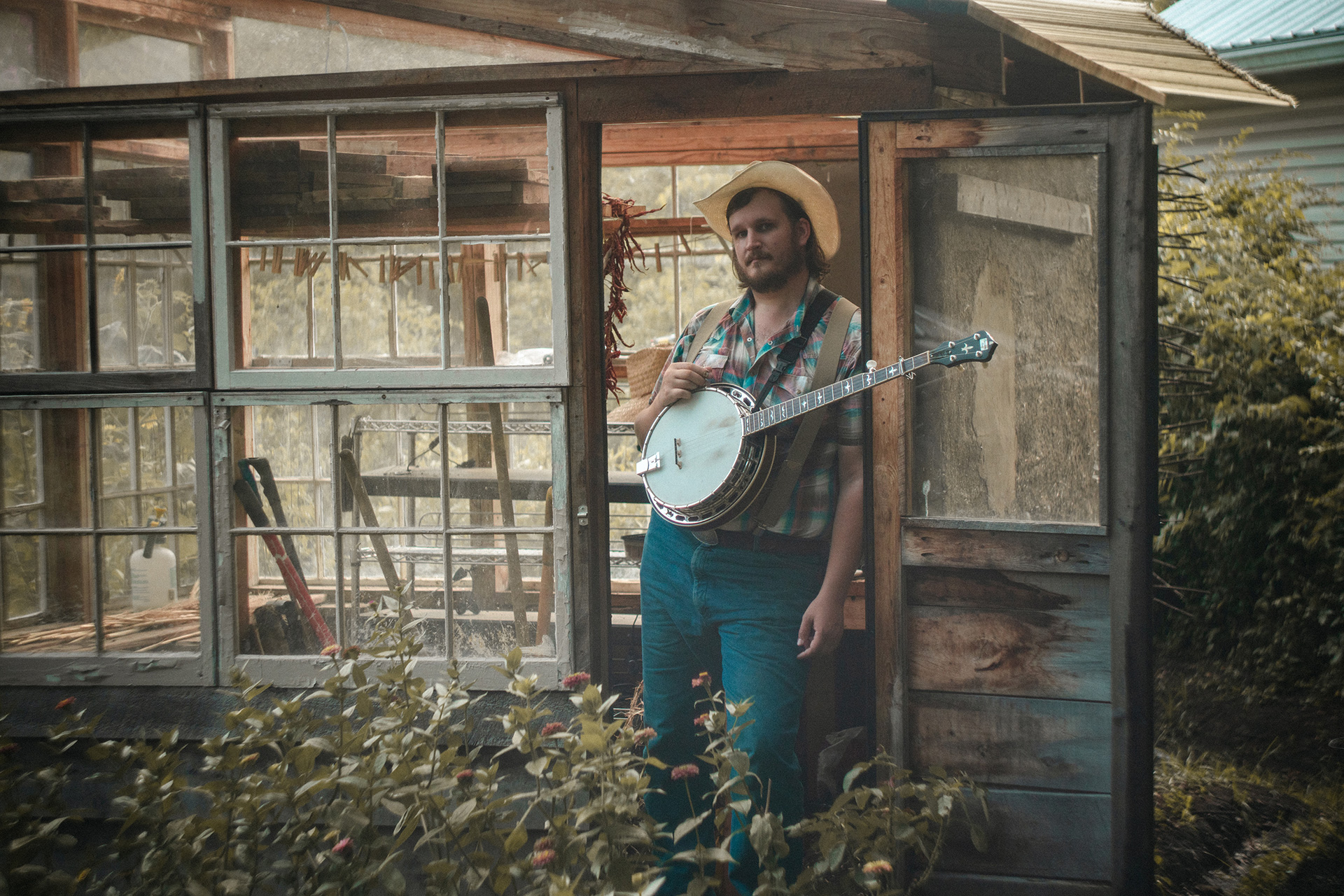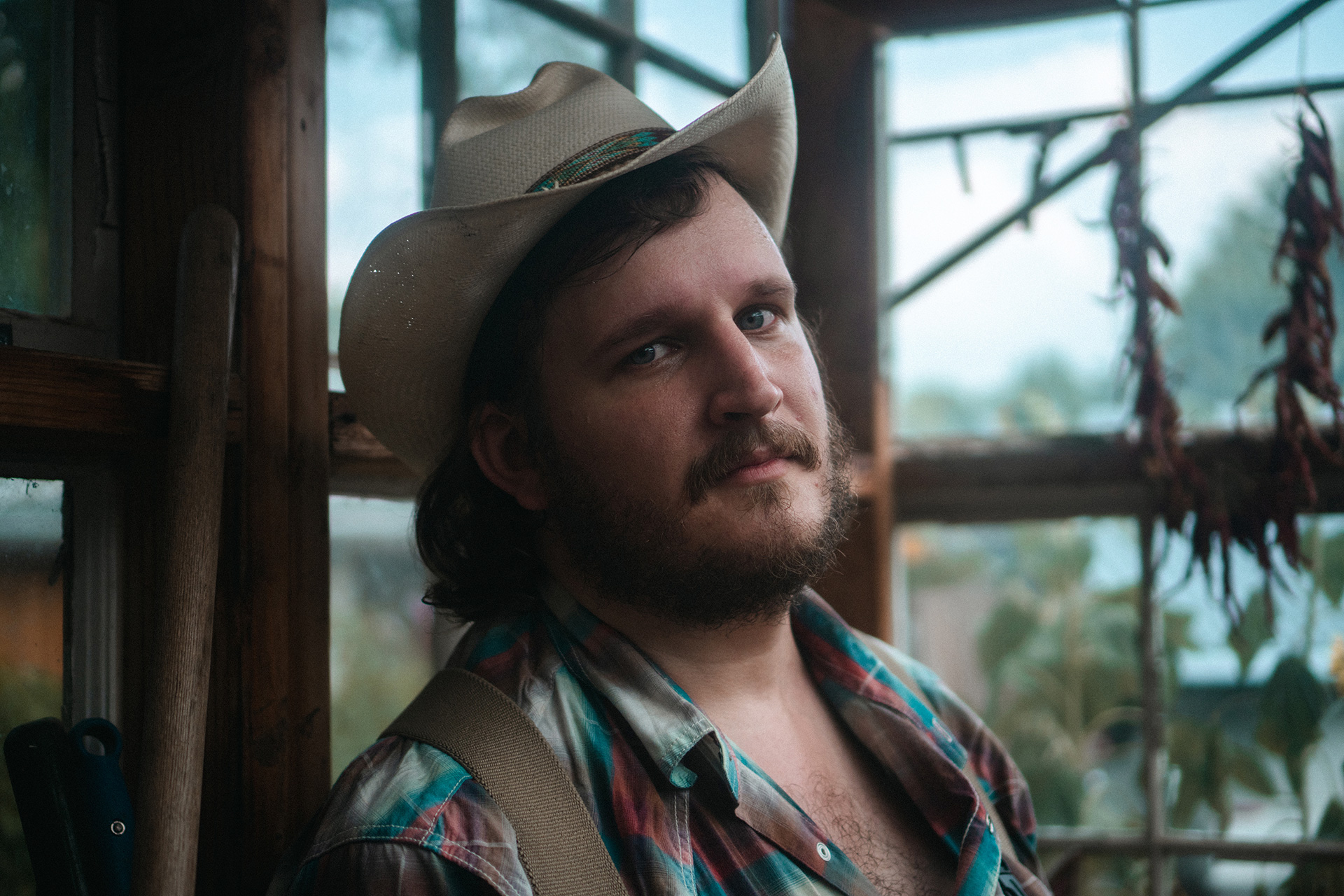
Willi Carlisle’s Song of Himself
“Salvation.” It’s right there in our name. It’s an elusive state attained via unexpected detours and poorly drawn maps. Willi Carlisle’s second album, “Peculiar, Missouri,” lays bare the peculiar path that this Arkansas man traveled to a place where he can see salvation waiting for him.
Every so often, a songwriter comes along whose powerful language and devastating honesty can strip you to your second layer of skin. Someone who can capture the twisted tendrils of identity, pride, shame, sorrow and joy. Someone who can make you laugh while you cry as he holds your imperfections in the light.
Now, add to that a deft melodic sense, an ability to inhabit convincingly the gamut of forms associated with folk and country, and an impressive proficiency on around a half-dozen instruments. Also, too: He’s funny as hell.
And here’s the kicker: Our man’s singing echoes the best of country music’s hard-timers and outlaw troubadours, a voice rooted in a body that has seen, heard, and felt enough for a couple of lifetimes. He’s been everywhere, man, and rarely did he travel first class; much of the time, his conveyance and shelter would make Greyhound and Days Inn feel all smug.
That songwriter is Willi Carlisle, and his second album, “Peculiar, Missouri” (Free Dirt Records, 2022), is destined to stand next to the best of Willie or Waylon or Haggard or Cash. That’s ridiculously high praise, but I plan to be here in 20 years to say I told you so.
That the album happens to fit squarely in the emerging queer country space — a label that is both a declaration of freedom and a strategic marketing gambit — offers yet another clue to the multitudes contained in Willi Carlisle. But while “Peculiar” is decidedly out and proud (there is nothing subtle about the pale pink theme of the album jacket), his insight is spot on for anyone who ever woke up at 3 a.m. wondering, as David Byrne once sang, “Well, how did I get here?”
Carlisle is a songwriter for misfits everywhere, his lyrics both plea and roadmap for finding and trusting the truth about oneself. But while his songs capture the essence of the working stiff, the homeless and the dispossessed, Carlisle can just as easily shift (as in a recent grammy.com interview) to describing an autistic magician who is “a wonderful liaison to his neurotype and his craft” or how history can “balm epigenetic wounds.”
Who the hell is this guy?
Born to a standard middle-class family in Kansas, Carlisle grew up in a home filled with music, thanks to a music-besotted father who as good as forbade his son to become a musician. At six-foot-four and pushing 300 pounds, he became the captain of his high school football team, all the while performing in theatrical productions, singing in choirs and reading and writing poetry. And, not so incidentally, living the life of a closeted queer trying to fit in and overcome the shame and despair that living such an essential lie must inevitably entail.
That the album happens to fit squarely in the emerging queer country space offers another clue to the multitudes contained in Willi Carlisle.
He enrolled in Knox College in Galesburg, Illinois, where he started singing in a punk band and attending square dances. Feeling a pull toward the folk scene, he started learning a few instruments and eventually began performing folk music in his senior year, often as opening act for the punk bands he used to play with.
In an email exchange, Carlisle described his college days like this:
I got a lot of "Ds", slept in a closet and invented a phony minor. It was a little wild, but the permissiveness of that environment really helped me flourish: I could skip class for a week to take a Greyhound to a fiddle convention, I could show up to our class on Walt Whitman high as a kite, so on. I'll be in debt forever, but it let me be a working artist from day one.
Despite his lackluster college career, he accepted a fellowship to the creative writing program at the University of Arkansas. When I asked why, Carlisle said, “I saw it as a means to an end: to continue my life as an artist, to write and sing and carve my own way. Academia felt a lot more foolish than what I do now.”
Fair enough. An extended stay in higher education is a time-honored strategy for avoiding whatever passes for the real world. But in his official bio, Carlisle also admits that he “wanted to be involved in something that was high-falutin’. I really did. My parents and my family struggled to reach the middle class. It defines their generational and epigenetic perch. The American Dream incarnate.”
I asked if his approach to grad school was any different than his haphazard Knox College days.
I admit it was about the same! I was traveling around, being a bum, and had no clue what to do. Like a lot of clueless and over-educated folks, I decided an MFA would be the way to bide time, to figure things out. I wanted to be a working artist, and I loved folk music but hadn't yet heeded the call entirely. One night I made a pilgrimage to Carl Sandburg's grave and I told him (or the dirt over him) that I was going to be a folk singer. The letter from Arkansas admitting me came shortly after, and I'd applied to Arkansas to be close to a few well-known banjo players like Clarke Buehling. Arkansas brought me into the loving fold of fiddle music, folk singing and square dances that is now my tradition and my joy. The MFA was perhaps an afterthought. 🙂

Let’s take the "afterthought" claim with a couple grains of salt; nobody with Carlisle’s evident love of Whitman, Sandburg and ee cummings got that way by accident. Carlisle allows that he “loved everything about BEING a poet in grad school: the rigor, the uncompromising critique, the really difficult books. I was determined to take all I could from it insofar as it allowed me to be a working artist and do folklore work.” But his commitment to scholarship came in an obvious and distant second to his passion for music.
“I feel like I finally came into my own while working at a used bookstore and playing tons of concerts, visiting and apprenticing with folk masters, and calling square dances,” he said.
Carlisle dove deep into that “loving fold,” learning a few more instruments and visiting and recording all the old Ozark musicians and storytellers he could find. And, like so many before him, he discovered Harry Smith's "Anthology of American Folk Music" and fell down the traditional music rabbit hole.
By then he was putting his poems to music and performing everywhere he could, including a cross-country tour of a one-man play he wrote called “There Ain’t No More” that won acclaim at fringe theater festivals and other off-off-off-off-Broadway joints.
By this point you must think: Dang, this kid was living all kinds of dichotomies – Trichotomies! Quadrachotomies! – battling the demons of being a self-loathing queer singer in a traditionally macho genre and straying far from parental expectations. Not to mention a pocketful of neuro/emotional shitstorms and the occasional bout of suicidal ideation.
His self-released first album, “Too Nice to Mean Much,” and a subsequent EP offer glimpses, but “Peculiar” is where the elements truly come together. It is a masterpiece of traditional music and richly poetic language seasoned with compassionate observation of others and brutal examination of self. In this era of individual tracks and playlists, “Peculiar” is a bona fide album that deserves attention from beginning to end.
In his liner notes, Carlisle writes, “Nobody wants to be a rambler, not really. No matter how much the ‘ye olde folksinger’ aesthetic might boast it with hobo costumes and funny hats. Everyone wants to find home.” Sure, the songs are pretty much about the traveling life, but he insists they are “about people who don’t fit in, whose journey isn’t done, who are unsettled. Not because they wanna be. Because they have to be.”
The first video for the album presents “Vanlife,” a straight up banger that “celebrates” the glamor of being a rambling man. Country music is rife with glory-of-the-road ravers, and this bears all the earmarks of that familiar style. But the story starts to run off the highway when the sing-along chorus belts out:
They call it…
Vanlife, I been told this
It’s a fine life, I’ve been sold this
But it’s a fine line between having to and choosin’ it
Let’s roll up, let’s blow this!
Pretty soon, pissed-off homeowners call the cops to move his ass along. The van breaks down and somebody robs him amid “the call of the wild, the call of the road / the endless search for a clean commode.” In case we miss the drift, midway through the video Carlisle holds up a hand-scrawled sign declaring “this adventure sucks.” It might sound like Waylon or Willie, but the sentiment is closer to the movie “Nomadland.”
Fractal highways, friends like smoke
It all goes up and you end up alone
It’s like the internet is your real home
The title track is a talking blues over a warbling calliope that sounds like an old 78 record left out in the sun. It is the tale of a road-weary traveler being visited by the ghost of Carl Sandburg at the Peculiar Walmart during a middle-of-the-night provisions stop. The narrator intones, “I think we might need to get out of here / ’Cause it seems like I'm having a come-apart here in the cosmetics aisle.” He makes for the exit, the walls of Wally World closing in fast. Back behind the wheel, the song ends with the narrator wondering, “I sure wish I knew what we were supposed to do with ourselves / If you get any good ideas, won't you let me know?”
One answer lies in the album’s opener, “Your Heart’s a Big Tent.” This one is all heart and hope, right from the opening couplet — “This morning a miracle happened as promised / The rising of the world’s closest star” — straight into the banger of a chorus that declares, “The heart’s a big tent / Ya gotta let everybody in / Doesn’t matter who they are.” I’m dying to sing along with a crowd on this one. But it’s the out verse that brings it home.
My conclusion’s not a great one, I’ll leave that to the smarter ones
The soul is an idiot, and it doesn’t care why
Whatever you do with it, the gift’s a pretty simple one
Just sing until you love yourself, then love until you die
Solid advice from a guy who had to learn it the hard way, a man of multitudes navigating precarious contradictions.
The predicament gets laid bare in the second track, “Life on the Fence.” It’s a standard country heartbreak number with its fiddle intro and keening pedal steel, right up until the opening lines:
He’s callin’ me up, he’s sure I might love him
I only answer when I’m drunk to the lees
It’s as clear a declaration of same-sex attraction you’ll hear in country music this side of Lil Nas X’s glorious cover of “Jolene.” But where the Lil Nas X character is proudly out, the narrator here is torn to bits by his shame, driving hell for leather to get back to his wife, “hidebound and determined that I could unlearn this / She’d make me shiny and new.”
But what happened in Memphis made too much sense
There’s a part of my life she don’t know exists
Why is livin’ a lie more easy than life on the fence?
Despite the centrality of queerness, Carlisle is no one-note Johnny. The heart and soul of the album lies in its evocation of the frustrations, fears and avoidances that so many of us accept as natural, no matter how miserable they might make us feel and act. “I Won’t Be Afraid Anymore” is probably too quiet to be considered an anthem, but it damn sure qualifies as a hymn of liberation as the opening stanza proclaims:
I won't be afraid anymore
Lord knows I’ve done some dumb shit
And I plan to do some more
But I won't be afraid anymore
After declaring he will “dance like somebody’s proud of me” and declaring “I’m all right with going to hell / Seems like the city on the hill is gettin’ crowded,” Carlisle returns to the opening stanza before closing with: “I don’t have to be ashamed of what I love.”
Now that I hear it again, I’m about ready to sing along with this one in a crowd, too.
Go. Listen.

Rob Rushin-Knopf blogs about culture at Immune to Boredom.
Rob Rushin-Knopf writes about music and culture at Immune to Boredom.

